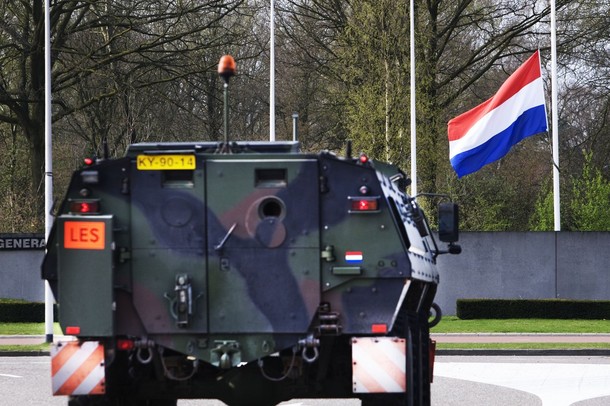
The Dutch Government has fallen over Afghanistan. As a result the August 2010 withdrawal of Dutch forces from Uruzghan, the Afghan province into which the Netherlands has invested money and lives for eight years, will be confirmed.
Long-respected for their commitment and willingness to engage with the Afghan people, no ally or partner can deny the excellent job a small but robust force of almost two thousand Dutch soldiers have done, together with their civilian partners. Not least in the novel approach they have forged to civil-military partnership and outreach to the Afghan people. Indeed, the so-called 3Ds (defense, diplomacy and development) has in many important respects become the model for how to run a provincial construction team.
There are many good reasons for this departure. The Dutch have already extended their commitment by two years beyond the original mandate of August 2008, and the force is showing real signs of wear and tear after so many years in one of the most challenging parts of Afghanistan. Moreover, with the 2009 departure of Jaap de Hoop Scheffer as NATO Secretary-General and given the unpopularity of the war in the Netherlands, a political threshold has been crossed for what was an increasingly weak and divided government.
Still, the implications will go far beyond the Netherlands.
The impact on current operations in the south of Afghanistan will be marked, at least temporarily, until U.S. or other Allied combat forces replace the Dutch and get experience in the province. Uruzghan occupies a strategic position between the war-torn south and Kabul. Over eight years the Dutch have invested in both physical and human infrastructure that has enabled them to reach into the community. With their Australian partners in Uruzghan refusing to take a lead role, much of that effort and many contacts will be lost at what is a critical moment in the campaign as U.S. forces intensify the pressure on the Taliban.
Alliance cohesion, fragile at the best of times, will be further undermined at a critical moment. The Dutch are the first NATO ally and European state that has unilaterally signaled its intention to leave. The Canadians could well follow suit and leave Kandahar. For most other Europeans, this could well prove to be a signal moment. No European has wanted to be the first to quit the struggle. However, the commitment of allies such as Germany, Spain and Italy has been lukewarm at the best of times and the Dutch departure will doubtless increase pressure on them to leave. Tragically for the Dutch, all the good work they have undoubtedly done could well be forgotten as they inadvertently trigger a sustained European exodus from Afghanistan. This is unfair not least because the Dutch departure has been triggered by a refusal of allies in more stable regions to send troops south.
ISAF has just created a new joint command which seeks to merge counter-terror (CT) and counterinsurgency (COIN) efforts. This effort is U.S.-led and rightly so because the Americans are investing such a huge effort in what President Obama sees as the critical phase of the campaign in the critical space of the AFPAK region. Had the Dutch stayed until the stated peak of the surge in July 2011 a stronger European presence would not only have helped to underpin the legitimacy of the campaign but also ensured that ISAF represents a merger of European and American efforts, rather than the takeover it will now appear to be.
The departure of the Dutch will doubtless reinforce a belief both in the Afghan Government and key elements of the international community, such as the United Nations and leading non-governmental organizations (NGOs), that only the Americans (and to some extent the British) are reliable partners. This will likely affect the willingness of the Kabul government to work with Europeans and further undermine the influence of Europeans over the government and mission.
The departure of the Dutch will take place just as the EU’s Common Security and Defense Policy (CSDP) is being inaugurated, further undermining what is a very fragile process towards European security self-determination.
However, the greatest impact will be on NATO and with it the wider transatlantic relationship. The Dutch departure is scheduled for the eve of NATO’s new strategic concept, in effect NATO’s ten year plan for dealing with a dangerous and complex world in which stabilization and reconstruction missions will be front and center. Should the Americans and British be forced to fill the Uruzghan space with little or no help from allies in the north and west of Afghanistan, then to the heavily-burdened Americans and British the message will be clear: the solidarity implicit in the strategic concept will be as empty as the Helmand desert.
But as with most adversity, opportunity exists. Should the French, Germans, Italians or other allies show the political determination to send two thousand troops to Uruzghan to continue the work of the Dutch, the political message such a positive move would send would resonate far beyond the Hindu Kush. Indeed, even such a modest offer of support could well provide the springboard for further Allied commitment and cohesion in Afghanistan, and thereby also give the new Strategic Concept both substance and meaning.
Though we wish they could stay, the Dutch have earned the right to quit Afghanistan with heads held high. Sadly, however, politics dictates that the Dutch will be seen to have failed when in fact the real failure is if no one else in NATO comes forward to replace them. Thankfully, it is failure which can still be avoided.
Julian Lindley-French is Eisenhower Professor of Defense Strategy at the Netherlands Defense Academy. Kurt Volker is the former US Ambassador to NATO, and Managing Director of the Center for Transatlantic Relations at Johns Hopkins School of Advanced International Studies. Both are members of the Atlantic Council’s Strategic Advisors Group (SAG). Photo credit: Getty Images.
Image: dutch-afghanistan-kamp-holland.jpg
